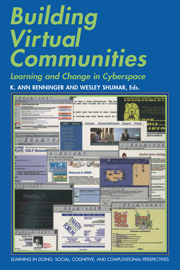Book contents
- Frontmatter
- Contents
- List of Tables and Figures
- Contributors
- Series Foreword
- Preface and Acknowledgments
- Foreword: Virtual Communities for Learning and Development – A Look to the Past and Some Glimpses into the Future
- Building Virtual Communities
- Introduction: On Conceptualizing Community
- Part One Types of Community
- Part Two Structures and Community
- Part Three Possibilities for Community
- Afterword: Building Our Knowledge of Virtual Community: Some Responses
- Afterword: Building, Buying, or Being There: Imagining Online Community
- Index
- References
Afterword: Building Our Knowledge of Virtual Community: Some Responses
Published online by Cambridge University Press: 12 November 2009
- Frontmatter
- Contents
- List of Tables and Figures
- Contributors
- Series Foreword
- Preface and Acknowledgments
- Foreword: Virtual Communities for Learning and Development – A Look to the Past and Some Glimpses into the Future
- Building Virtual Communities
- Introduction: On Conceptualizing Community
- Part One Types of Community
- Part Two Structures and Community
- Part Three Possibilities for Community
- Afterword: Building Our Knowledge of Virtual Community: Some Responses
- Afterword: Building, Buying, or Being There: Imagining Online Community
- Index
- References
Summary
The generic conventions of an afterword to a printed collection provide an author of the afterword with substantial freedom but also considerable responsibility. Not having been involved in the conception of the project or selection of the contributors, the author has relatively little stake in the outcome. Constrained only by those general rules of scholarly etiquette, the author can more or less say anything. By the same token, however, readers can presume that what the author says is indeed what he or she thinks!
In the light of these considerations, please permit me a few words of situating. I started thinking seriously about education, automated information technology (AIT), and change in general social dynamics like community a long time ago. In the early 1970s, I was a staff person for a new left U.S. organization, New University Conference (NUC). As described in my book, Cyborgs@Cyberspace? (Hakken, 1999), NUC's interest in this topic was political, prompted by concern for the de-skilling impact of computerized teaching machines on teachers' work and whether this might lead to greater militancy. I have continued to think about these intersections, as an educational anthropologist (who did a dissertation on workers' education in Sheffield, England); an ethnographer of technology and social change at levels from the local to the global; a consultant on numerous social programs, including the evaluation of several educational initiatives; and a college professor teaching about community more consistently than anything else for twenty-three years, using a variety of technical tools to do so.
Information
- Type
- Chapter
- Information
- Building Virtual CommunitiesLearning and Change in Cyberspace, pp. 355 - 367Publisher: Cambridge University PressPrint publication year: 2002
References
Accessibility standard: Unknown
Why this information is here
This section outlines the accessibility features of this content - including support for screen readers, full keyboard navigation and high-contrast display options. This may not be relevant for you.Accessibility Information
- 2
- Cited by
